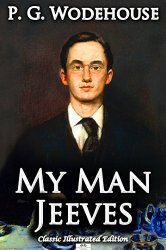
Review posted 01/25/2015.
The Overlook Press, Woodstock & New York, 2006. First published in 1919. 185 pages.
According to Novelist, My Man Jeeves is one of the first books P. G. Wodehouse wrote that includes Jeeves and Wooster. The library doesn’t have it in audio form, so I settled in to reading one story per day – a lovely way to add a smile to my days.
This is a collection of short stories, not all of them about Jeeves, and the author hadn’t gotten quite as fully into the form yet. I love his book-length stories, because in those he can develop an incredibly tangled imbroglio for Jeeves to solve.
However, these were delightfully fun, and were sure to add a smile to my day every time I fit one in. Some of my favorites were actually the ones not about Jeeves, since although similar, they were a little more unexpected. In “Absent Treatment,” Reggie Pepper has to figure out how to save the marriage of a frightfully forgetful friend. (He can’t remember the date of his wife’s birthday.) And in “Helping Freddie” he helps a friend get back with the girl he was engaged to by means of a scheme that goes hilariously wrong. And there’s a similar theme in “Rallying Around Old George,” though a very different scheme that goes wrong.
P. G. Wodehouse is in top form, as always, with regard to expressions and turns of phrase that evoke a feckless young man of the twenties. Here’s Bertie when he has to spend a night in a hotel because a friend’s aunt thinks Bertie’s home belongs to the friend:
As I stood in my lonely bedroom at the hotel, trying to tie my white tie myself, it struck me for the first time that there must be whole squads of chappies in the world who had to get along without a man to look after them. I’d always thought of Jeeves as a kind of natural phenomenon; but by Jove! of course, when you come to think of it, there must be quite a lot of fellows who have to press their own clothes themselves, and haven’t got anybody to bring them tea in the morning, and so on. It was rather a solemn thought, don’t you know. I mean to say, ever since then I’ve been able to appreciate the frightful privations the poor have to stick.
